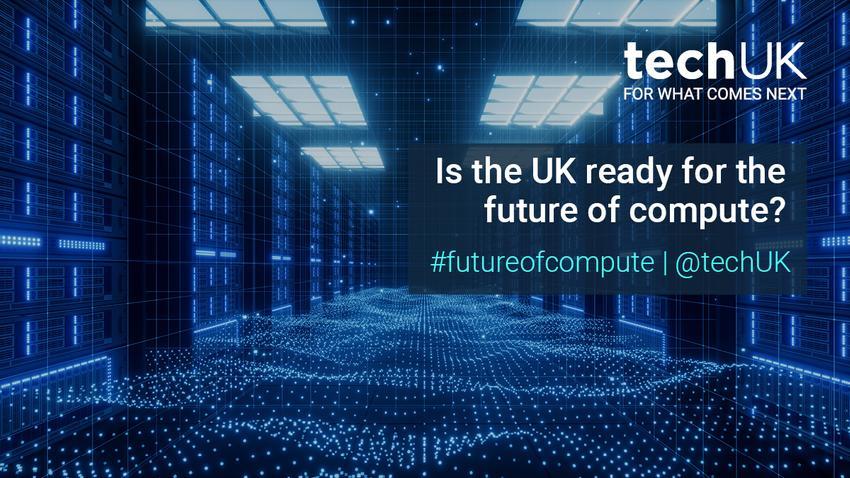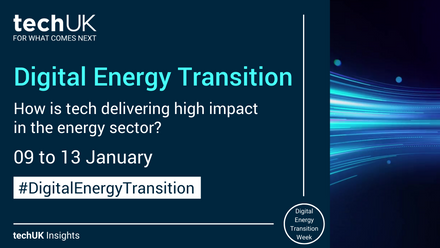Announcing techUK’s Future of Compute Campaign Week

If you would like to get involved in this work, we are looking for techUK members to submit thought leadership articles (approx. 600 words), based on one of the themes below. This is a great way to showcase your work in this area and share best practice with the techUK community. Please contact [email protected] to get involved!
During this campaign week, techUK will be sharing industry-led insights on what unlocking the potential of large-scale compute (HPC, exascale and supercomputing infrastructure) in the UK could mean for the UK’s society and economy. Whether you are interested in contributing your industry expertise or want to discover more about the opportunities of large-scale compute, this is for you!
Why is techUK hosting a Future of Compute Campaign Week?
Access to advanced compute - the ability to process data at scale and solve complex problems at speed, whether through high-performance computing (HPC) or other large-scale compute (LSC) - is essential to R&D in a range of sectors, including healthcare and drug discovery, engineering and manufacturing, financial services and risk analysis, particle physics, materials science and more.
In our response to the Government’s recent Future of Compute Review, techUK argued that we need a long-term strategy to develop access to LSC and build a thriving ecosystem here in the UK. The strategy should examine supporting factors like skills, routes of access, data policy, safeguarding intellectual property, and supply chain resilience. It should also explore the convergence of LSC with other key technologies like quantum, cloud, and AI.
This week will explore with members how we can develop our compute infrastructure and leverage this crucial group of technologies to support the UK’s ambitions as a science and technology superpower.
Monday - What is HPC, and why is it important for the UK?
The first day of techUK’s Future of Compute Week will showcase why high performance compute infrastructure is vital to the UK's science and technology ecosystem especially for unlocking the power of data.
The growing volume and diversity of data, accelerated by digital transformation across the economy, presents new research opportunities for industry and academic researchers, such as the development of new data-driven products and services, as well as solutions to pressing societal challenges such as social inequality, climate change and healthcare for an ageing population.
Whilst some of this can feasibly be dealt with by smaller systems, there will be some use-cases, such as genome sequencing, where the data will be extensive and complex. Here, high performance compute infrastructure will be vital to process and analyse this data, gain insights, and extract value.
We will also look ar the different HPC use cases that are powering research and innoavtion in the UK, and why this means compute is an integral part of the UK's technology toolkit.
Tuesday - Quantum, HPC and AI: Emerging technologies underpinning the future of compute
techUK will explore why compute infrastructure is at the heart of the UK’s technology toolkit that will make the UK a science and technology superpower.
High-performance computing and artificial intelligence are already vital tools for R&D, helping to solve complex scientific and industrial challenges in sectors like life sciences, financial services, energy and manufacturing, and these capabilities are increasingly essential for research, product development, prototyping and testing. We are also seeing a growing convergence of HPC with quantum and cloud computing, heralding a future of on-demand and quantum accelerated compute, delivered as a service through public or private cloud. techUK will showcase areas where convergence of HPC with other technologies is already bringing real-world change, whilst also highlighting what we need to do in the UK to ensure technology ecosystems can work together long term to build on this success.
Wednesday - HPC and the UK workforce
There is a critical shortage of skilled compute professionals in the UK which will limit the supply of high-performance and other large scale compute capacity. On Wednesday 30 November, we will discuss how to lower the barriers to entry for a career around compute that will allow more talented people to enter the sector, increase the sector’s diversity, and fill industry job shortages. This could include developing non-degree entry routes, apprenticeships, and retraining opportunities. We will also hear from the UK tech sector about how they are leading the way to build career pathways into compute and the wider tech sector.
Thursday - International collaboration
The development of HPC and other compute infrastructure represents a significant scientific advance with the potential to benefit many. However, international collaboration is increasingly challenging asâ¯computing technology isâ¯seen more widely asâ¯not only commercially valuable, but also significant from aâ¯national security perspective. Working towards adaptive regulatory strategies and industry standardization is essential to strengthen international collaborative partnerships and spur innovation in this space.
On Thursday 1 December we will showcase examples where international collaboration has directly supported the development of high-performance computing, as well as navigating how to best promote collaboration across nations, and how to support start-up and SME ecosystems develop access to compute. It will also identify areas where collaboration will be key, such as using compute to tackle international challenges such as climate change
Friday – Opening access to compute
The final day of techUK’s Future of Compute Week will look at the importance of opening access to LSC and HPC to a broad range of organisations, including start-up and SMEs across a range of different industries and sectors. Access can bring different concerns and challenges, such issues relating to intellectual property and security. As such, members will explore access models that mitigate these risks and promote industry use-cases.
We will also explore different models of access, including what opening access to computing centres in the UK and internationally could enable.
If you would like to share an insight or use case with techUK, please reach out directly to the tech and innovation team below!

Rory Daniels
Rory joined techUK in June 2023 after three years in the Civil Service on its Fast Stream leadership development programme.

Ella Shuter
Ella joined techUK in July 2025 as Junior Programme Manager for Emerging Technologies.

Laura Foster
Laura is techUK’s Associate Director for Technology and Innovation.

Elis Thomas
Elis joined techUK in December 2023 as a Programme Manager for Tech and Innovation, focusing on Semiconductors and Digital ID.








